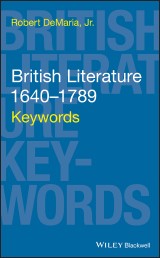Details
British Literature 1640-1789
KeywordsKeywords in Literature and Culture (KILC). 1. Aufl.
|
72,99 € |
|
| Verlag: | Wiley-Blackwell |
| Format: | EPUB |
| Veröffentl.: | 03.04.2018 |
| ISBN/EAN: | 9781119208518 |
| Sprache: | englisch |
| Anzahl Seiten: | 256 |
DRM-geschütztes eBook, Sie benötigen z.B. Adobe Digital Editions und eine Adobe ID zum Lesen.
Beschreibungen
<p><b>An indispensable reference for scholars and students of eighteenth-century English literature</b> </p> <p>This addition to the celebrated Wiley-Blackwell Keywords series explores the meanings of fifty-eight of the most important words in British literature of the period 1640-1789. Professor DeMaria focuses on words used with frequency and urgency throughout the works of most major and several minor writers of the British Neoclassical era, with the occasional reach back to the early seventeenth century for a definitive usage found in Francis Bacon, for instance, and look forward to the nineteenth century to the works of Wordsworth, Austen, and Keats. Through discussions of words such as <i>atom, economy, humanity, labor, machine, slavery, society</i>, and <i>system</i> he reveals underlying assumptions about the way writers of the period thought about the physical and social world. Likewise, considerations of words such as <i>happiness, passion, truth</i>, and <i>virtue</i> shed light on the ethical and moral commitments of the age. Unlike dictionaries and many big-data semantics projects, this book brings forth the ambiguities, nuances, and ironies that accrued to word usages during the period through a heightened awareness of the contexts in which they occurred.</p> <ul> <li>Highlights and exposes the salient cultural and literary debates and metamorphic moments of cultural thought</li> <li>Reveals an increase in irony and a decrease in allegorical usage as an important trend in the evolution of literary language during the Neoclassical period</li> <li>Stresses the contexts within which words or phrases appear in order to offer a fuller understanding of their meanings and significance than available from digital databases</li> <li>Draws upon a vast compilation of sources from one of the most transformative eras of English literature</li> </ul> <p>Rigorous in its scholarship and historical reach, <i>British Literature 1640-1789: Keywords</i> is an indispensable resource which scholars and students of British Neoclassical literature will want to keep close at hand. It is certain to become a fixture of most university reference libraries. </p>
<p>Note on References ix</p> <p>Short Titles and Abbreviations x</p> <p>Introduction xii</p> <p><b>A 1</b></p> <p>Address 1</p> <p>Admiration and Wonder 5</p> <p>Advancement 7</p> <p>Ardor 10</p> <p>Atheism 13</p> <p>Atom 16</p> <p>Attention 21</p> <p><b>B 25</b></p> <p>Barbarism 25</p> <p>Beauty 27</p> <p>Belief 31</p> <p>Business 35</p> <p><b>C 39</b></p> <p>Conversation 39</p> <p><b>D 43</b></p> <p>Domestic 43</p> <p><b>E 47</b></p> <p>Economy 47</p> <p>Enthusiasm 50</p> <p>Expedient 54</p> <p>Experience 57</p> <p><b>F 61</b></p> <p>Fortune 61</p> <p><b>G 67</b></p> <p>Genius 67</p> <p>God 70</p> <p>Grubstreet 75</p> <p><b>H 79</b></p> <p>Happiness 79</p> <p>Humanity 85</p> <p><b>I 89</b></p> <p>Idea 89</p> <p>Imagination 93</p> <p><b>J 98</b></p> <p>Judgment 98</p> <p><b>L 102</b></p> <p>Labor 102</p> <p>Learning and Literature 106</p> <p>Life 110</p> <p><b>M 116</b></p> <p>Machine and Engine 116</p> <p>Man 120</p> <p>Melancholy 123</p> <p>Modern 126</p> <p><b>N 130</b></p> <p>National 130</p> <p>Nature 133</p> <p>News 139</p> <p>Nice 142</p> <p>Novel 144</p> <p><b>P 148</b></p> <p>Passion 148</p> <p>Patriot 152</p> <p>Philosophy 155</p> <p>Pride 158</p> <p>Primitive 163</p> <p><b>R 168</b></p> <p>Reason 168</p> <p>Revolution 173</p> <p>Romance 177</p> <p><b>S 181</b></p> <p>Savage 181</p> <p>Science 184</p> <p>Sensibility 188</p> <p>Slavery 192</p> <p>Society 195</p> <p>Spleen 199</p> <p>System 201</p> <p><b>T 205</b></p> <p>Truth 205</p> <p>V 211</p> <p>Virtue 211</p> <p><b>W 218</b></p> <p>War 218</p> <p>Wit 222</p> <p>Woman 225</p> <p>World 229</p> <p>Index 235</p>
<p><b>Robert DeMaria, Jr.</b> is the Henry Noble MacCracken Professor of English Literature at Vassar College where he has taught since 1975. He is the author of three monographs on Samuel Johnson and the general editor of the Yale Edition of the <i>Works of Samuel Johnson</i>, in which he has co-edited three volumes. He has also edited and co-edited several collections for Wiley Blackwell, including <i>British Literature 1640</i>–<i>1789,</i> 4th Edition; <i>Classical Literature and Its Reception</i>; and <i>The Blackwell Guide to British Literature</i>.</p>
<p><b>An indispensable reference for scholars and students of eighteenth-century English literature</b></p> <p>This addition to the celebrated Wiley Blackwell Keywords series explores the meanings of fifty-eight of the most important words in British literature of the period 1640–1789. Professor DeMaria focuses on words used with frequency and urgency throughout the works of most major and several minor writers of the British Neoclassical era, with the occasional reach back to the early seventeenth century for a definitive usage found in Francis Bacon, for instance, and look forward to the nineteenth century at the works of Wordsworth, Austen, and Keats. Through discussions of words such as <i>atom, economy, humanity, labour, machine, slavery, society</i>, and <i>system</i> he reveals underlying assumptions about the way writers of the period thought about the physical and social world. Likewise, considerations of words such as <i>happiness, passion, truth</i>, and <i>virtue</i> shed light on the ethical and moral commitments of the age. Unlike dictionaries and many big-data semantics projects, this book brings forth the ambiguities, nuances, and ironies that accrued to word usages during the period through a heightened awareness of the contexts in which they occurred.</p> <ul> <li>Highlights and exposes the salient cultural and literary debates and metamorphic moments of cultural thought</li> <li>Reveals an increase in irony and a decrease in allegorical usage as an important trend in the evolution of literary language during the Neoclassical period</li> <li>Stresses the contexts within which words or phrases appear in order to offer a fuller understanding of their meanings and significance than available from digital databases</li> <li>Draws upon a vast compilation of sources from one of the most transformative eras of English literature</li> </ul> <p>Rigorous in its scholarship and historical reach, <i>British Literature 1640</i>–<i>1789: Keywords</i> is an indispensable resource which scholars and students of British Neoclassical literature will want to keep close at hand. It is certain to become a fixture of most university reference libraries.</p>


















